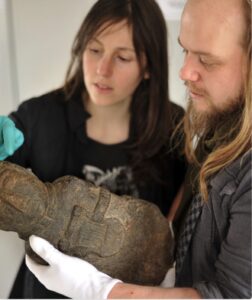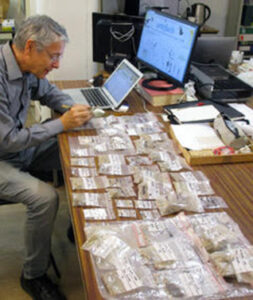Discover how a short educational fiction movie can instill in young people the love of reading while allowing them to get acquainted with scientific education and its language through archaeology.
Fairies vs Facts: from reading to theater
The project
 Launched in October 2018 by ArkeoTopia, the short movie project called Fairies vs Facts: from reading to theater aims to promote reading among the youngsters.
Launched in October 2018 by ArkeoTopia, the short movie project called Fairies vs Facts: from reading to theater aims to promote reading among the youngsters.
In the course of his school talks, archaeologist and ArkeoTopia president Jean-Olivier Gransard-Desmond noticed on more than one occasion how prone the young were to give reading a cold shoulder, considering it to be merely a solitary and dull recreation. To prove them wrong, it appeared necessary to create a fun teaching device and make it accessible to the wider public.
The project Fairies vs Facts originates from a short story by Christiane Angibous-Esnault, from her 2017 novel Panic at the Castle. Three Archaeological Adventures of Augustin (only available in French at the moment).
Indeed, this story contains a passage comprising several characters discussing the legends of King Arthur and their scientific foundations, staged in the middle of the Brocéliande forest. This excerpt perfectly suited the purpose of an English class aiming for children to grow fond of reading and to demonstrate how to turn an author’s text into a group performance.
But how to skilfully convey the reappropriation of a text read for oneself into a text shared with others? This is where the power of visual media is revealed. By imagining an open-source video tutorial in the form of a short fiction featuring boys and girls discovering how to transform solitary reading into oral play with others, the idea materialized to give birth to the project Fairies vs Facts: from reading to theater, which went online in August 2019.
By considering reading aloud and oral reading equally valuable, this fictorial (fiction with a tutorial goal) aims to share the written word in a fun and enjoyable group experience. For more information on the benefits of reading aloud and oral reading, entrée Lecture à voix haute sur Wikipédia.
Its applications
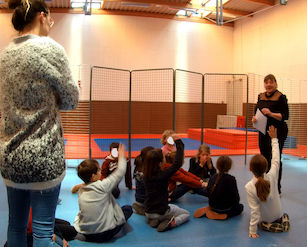 This fictorial can be used in different contexts, some of which remain yet to be discovered.
This fictorial can be used in different contexts, some of which remain yet to be discovered.
Here, we wish to highlight the following three:
- Family activity
- In the company of friends
- At school
On this webpage dedicated to the resources stemming from the project Fairies vs Facts: from reading to theater, we will elaborate upon the use of the video for didactic purposes, specifically in primary and middle schools. At the bottom of the article, we give an example of activities dedicated to reading aloud.
Naturally, if other applications of this instructive film occur to you, do not hesitate to tell us about them! You can write to us thanks to our form.
Before presenting the example of sequencing for students, we considered it useful to draw attention to the tools that will facilitate the use of the short fictorial Fairies vs Facts: from reading to theater.
The tools
Guidelines for setting the scene
For the shooting, we opted for a simplified staging due to a restricted budget, but also because we wanted to create something that basically everyone could use. You may, however, aspire to wear costumes or refine the setting. With this in mind, we provide you with the information below about the characters and the location where the action takes place in the novel Panic at the Castle. Three Archaeological Adventures of Augustin.
The characters
The excerpt of verbal jousting from the short story Fairies vs Facts in the novel Panic at the Castle. Three Archaeological Adventures of Augustin features the following six characters, listed in order of appearance in the story:
![]() The narrator: played by Maëlys Douchement-Gilet in the movie, the narrator is the alter-ego of the author Christiane Angibous-Esnault, providing useful information to help the reader understand the unfolding of the action and invite the characters of the novel to act.
The narrator: played by Maëlys Douchement-Gilet in the movie, the narrator is the alter-ego of the author Christiane Angibous-Esnault, providing useful information to help the reader understand the unfolding of the action and invite the characters of the novel to act.
![]() Mr Jean Montsard: played by Timéo Da Gloria in the movie, he is the History and Geography professor of the sixth-grade class of Augustin and his friends. Old-fashioned and disillusioned, this character struggles to gain respect from students but cares about his teaching. That is why he decides, together with professor Mondès, to take the kids to the Brocéliande forest and link history and geography to literature.
Mr Jean Montsard: played by Timéo Da Gloria in the movie, he is the History and Geography professor of the sixth-grade class of Augustin and his friends. Old-fashioned and disillusioned, this character struggles to gain respect from students but cares about his teaching. That is why he decides, together with professor Mondès, to take the kids to the Brocéliande forest and link history and geography to literature.
![]() Octave Chevalier: played by Lucie Pinto-Rybarczyk in the movie, Octave is both Augustin and Manon’s best friend. Poet interested in different poetic styles, he is also a foodie, which is the cause of his pudgy physique. Being overweight makes him naturally shy, but he finds the way to express himself through poetic art.
Octave Chevalier: played by Lucie Pinto-Rybarczyk in the movie, Octave is both Augustin and Manon’s best friend. Poet interested in different poetic styles, he is also a foodie, which is the cause of his pudgy physique. Being overweight makes him naturally shy, but he finds the way to express himself through poetic art.
![]() Augustin Delage: played by Antonin Perret in the movie, Augustin is the novel’s main character. Unlike his best friends Octave and Manon, he appears in each and every short story. The day he discovered that his grandfather was an archaeologist, he promised himself he, too, would become an archaeologist to support scientific research and protect heritage. Curious by nature, he always ends up in hairy situations. His motto: “Possibilities are prodigious!”
Augustin Delage: played by Antonin Perret in the movie, Augustin is the novel’s main character. Unlike his best friends Octave and Manon, he appears in each and every short story. The day he discovered that his grandfather was an archaeologist, he promised himself he, too, would become an archaeologist to support scientific research and protect heritage. Curious by nature, he always ends up in hairy situations. His motto: “Possibilities are prodigious!”
![]() Manon Cantera: played by Éva Chardine in the movie, Manon recently arrived in Dourdan. She meets Augustin and Octave, soon to become her best friends, at school. Founder of her 6th grade class’ newspaper and a tomboy handywoman, she often lends a hand to her friends with her knowledge of mechanics and engineering.
Manon Cantera: played by Éva Chardine in the movie, Manon recently arrived in Dourdan. She meets Augustin and Octave, soon to become her best friends, at school. Founder of her 6th grade class’ newspaper and a tomboy handywoman, she often lends a hand to her friends with her knowledge of mechanics and engineering.
![]() Mr. Jean Mondès: played by Liloé Da Gloria in the movie, he is the French professor of the 6th grade class of Augustin and his friends. Young and sophisticated, yet relaxed, he is very much appreciated of his students. He and professor Montsard take the students to the forest of Brocéliande to merge literature, history and geography.
Mr. Jean Mondès: played by Liloé Da Gloria in the movie, he is the French professor of the 6th grade class of Augustin and his friends. Young and sophisticated, yet relaxed, he is very much appreciated of his students. He and professor Montsard take the students to the forest of Brocéliande to merge literature, history and geography.
The locations
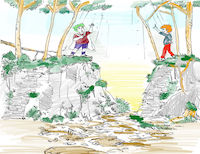 Unlike the novel’s short story, the movie’s scenario develops the action in two different locations.
Unlike the novel’s short story, the movie’s scenario develops the action in two different locations.
The first one is a library where the six friends meet. Jean-Olivier Gransard-Desmond considered it appropriate for the shooting of a fictorial dedicated to reading. Backed by the librarian Véronique Galonnier and the Mayor, the Rochefort-en-Yvelines municipality lent us their beautiful and welcoming library for the shooting. Naturally, you can choose a different spot: a classroom, recreational facilities, a street, and so on.
The second location is where the verbal jousting scene takes place. This scene is shot in the place known as Le Val sans retour (The valley of no return) in the Paimpont forest, on a dike of the Rocco like the one on the opposite image, showing Octave dressed as a bard for the occasion. This location offers the possibility for the two protagonists to confront each other orally, hence the idea to include chairs in the set design. Imagination is a crucial element in the reappropriation of a narrative.
The supporting files
- The portrayals of each character as well as a sketch of the verbal jousting location, can be downloaded and printed. Apart from these documents, you will need the video, and the scenario in a text format.
- The movie can be viewed from this site or through the following link, where you can also download from Wikimedia Commons page: Fairies vs Facts: from reading to theater. He contains english subtitles.
- Text and stage direction can be downloaded and printed from the link: Fictorial Fairies versus Facts: The Play. It includes the complete text of this version of Fairies vs. Facts, from reading to acting. Of course, you can arrange the script as you want.
Discussing with Augustin
Whether you have suggestions for this site, or you would like for Augustin to pay a visit to your students, through the medium of his creator Christiane Angibous-Esnault, you can send an email to augustin@arkeotopia.org or meet with our archaeologist to be on Facebook at @AventuresArcheologiques or on Twitter at @AArcheologiques or even on Instagram @MondedAugustin
About the author
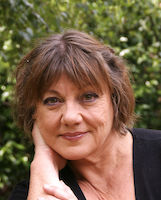 As a surprising, multi-talented artist, whose interests span a wide variety of disciplines, from poetry to painting, to photography, music and science, Christiane Angibous-Esnault will not cease to surprise you.
As a surprising, multi-talented artist, whose interests span a wide variety of disciplines, from poetry to painting, to photography, music and science, Christiane Angibous-Esnault will not cease to surprise you.
Heartened by La Rose de Dourdan Prize reception in 1987, the first in a series of prizes she won, and by a special prize at the 1995 Grand Prix de la Plume Lorraine for her short story Soleils et marécages (Suns and swamps), Christiane Angibous-Esnault cultivates her writing without neglecting her other talents. After her exhibition of photographs and watercolor paintings entitled Gods & Humans of Egypt, she is given the honor of being represented at the Parisian Center of Egyptian Culture in 2005, during that the annual Archaeology Week, and on many other occasions.
Besides having co-founded ArkeoTopia: An Alternative Approach to Archaeology with Jean-Olivier Gransard-Desmond in 2007, she gives drawing lessons and conferences on pioneer women writers in archaeology. Since she took a sip of the magic potion of archaeology, she also kept on performing thesis and research article reviews and even the review of scientific production in this very same field.
This encounter led her to lend her talented storyteller and singer-songwriter skills for the benefit of science education aimed at the youngest audience.
In 2008, she created the first of Augustin’s archaeological adventures, of which the first complete volume Panic at the Castle was available in libraries in 2017. The universe of Augustin has not stopped growing since, for the joy of the young and not-so-young.
You can find out the latest news about her through the website www.angibous-esnault.fr – angibousesnault@gmail.com
Activities for a read aloud sequence
This sequence integrates the fictorial (fiction with a tutorial goal) Fairies vs Facts. From reading to theater adapted in a way that it resembles as much as possible an actual teacher’s planner.
The proposed sequence focuses on english oral, reading, history and science learning for a group read aloud project involving teachers of English, history and sport education.
The knowledge and skills mobilized by subject are:
- in English, this project will mobilize the skills of text comprehension, reading aloud and memorization
- in History, this project will mobilize the knowledge and skills of understanding human societies in time and space with their contemporary consequences
- in sport education, this project will mobilize the skills of teamwork, task sharing and physical expression for the production of an artistic work such as a play
The sequence is suitable for classes of Primary School since 4th Grade to High School of any size, knowing that the idea is to create groups of 6 students with a text.![]() Download Activities for a read aloud sequence, version 1.0 created by Jean-Olivier Gransard-Desmond, archaeologist and teacher
Download Activities for a read aloud sequence, version 1.0 created by Jean-Olivier Gransard-Desmond, archaeologist and teacher
![]() The video file Fairies vs Facts. From reading to theater and the sequence are accessible under the license Creative Commons Attribution – ShareAlike 4.0 International which can be presented like this: CC BY-SA 4.0 ArkeoTopia, 2019
The video file Fairies vs Facts. From reading to theater and the sequence are accessible under the license Creative Commons Attribution – ShareAlike 4.0 International which can be presented like this: CC BY-SA 4.0 ArkeoTopia, 2019
You are therefore authorized to share (copy and redistribute the material in any medium or format) and adapt (remix, transform, and build upon the material) for any purpose, even commercially, giving appropriate credit to its author ArkeoTopia.
The rest of the works (illustrations, photographs from the set, scenario) are freely available for educational purposes but not for commercial use, and cannot be modified, transformed nor shared in any way. In order to request permission for commercial use of our content, or for its transformation of any kind, please address your inquiry to the association ArkeoTopia thanks to our form.





